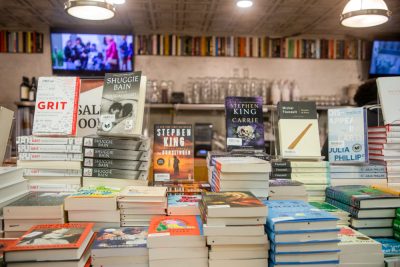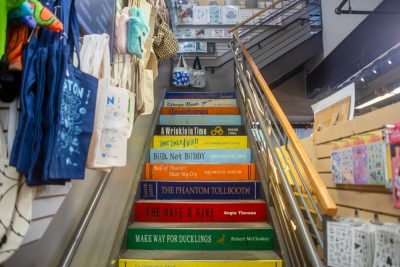When you walk into Trident Booksellers & Cafe on Newbury Street, you are bound to encounter a buzzing atmosphere with aromas of fresh food and coffee, lively chatter and furious typing. New and old books fill the shelves — worlds waiting to be discovered.

In the modern digital age, with online retailers becoming cheaper and more accessible, independent bookstores are turning toward building community as a successful business model in a competitive industry.
While larger chains provide a simple transaction and delivery process, independent bookstores are looking to provide customers with a meaningful shopping experience.
Courtney Flynn, a co-owner of Trident, said customers enjoy spending their time in the store for precisely that reason.
“People feel like they can be themselves,” Flynn said. “They can be alone, or they can be with others … It’s an open and non-judgemental space.”
Flynn described the store as “eclectic,” with something for everyone who chooses to walk through its doors, regardless of their reason for doing so.
“Some people come in for food, some come in for books,” Flynn said. “You don’t have to be one thing or another to be walking into the store and I think that’s why people connect with us.”
For Flynn, connecting with the community and maintaining authenticity are some of the most important traits of a store.
“We don’t try to combat anything,” Flynn said. “We just try to be who we are.”
Lisa Gozashti, a co-owner of Brookline Booksmith, an independent bookstore located in Coolidge Corner, echoed Flynn’s emphasis on staying true to a store’s identity.
“We’ve battled technology and the ease of a place like Amazon by doing what we do the best,” Gozashti said. “Having unique, singular experiences with our customers and each other.”
Rachel Cass, the general manager of the independent Harvard Book Store, said the support of the community is what keeps their business alive.
“We have many regular customers who know us and trust our booksellers and trust our recommendations,” Cass said.
Gozashti said the connections Brookline Booksmith has built in the Brookline community is the most important facet of the business.
“We are speaking to the most human aspects of our community,” Gozashti said. “What we found is that people want that now more than ever, they want it as an antidote to technology.”
Indeed, Brookline Booksmith is the perfect example of a store that transcends technology. Though the store may not look the same as it did when it first opened in 1961, its creaky hardwood floors, tightly packed shelves and warm lighting speak to its character.
“It’s a celebration of civilization,” Gozashti said. “All of the best aspects of community are represented on our shelves.”
Gozashti said she and the Brookline Booksmith staff work hard to ensure that they showcase as many human perspectives as possible with the books on their shelves to uphold the “integrity in the world of arts and letters.”
That aspect of community is what makes Brookline Booksmith so unique, Gozashti said. It allows the customer to feel a personal connection to the store rather than a simple transactional experience.

“They know their value,” Gozashti said. “They know that they have a say in who we are and that we actually respect them in our community.”
Flynn and the Trident staff similarly focus on connecting with the community by offering unique experiences unavailable through the likes of Amazon and other large corporations.
From themed trivia nights to poetry readings and speed dating, Trident offers a variety of social events on a near-daily basis. They also aim to promote the voice of historically marginalized groups, such as the LGBTQ+ community, by hosting themed events.
Gozashti said Brookline Booksmith is involved in philanthropic endeavors to help better the community. The store regularly donates money to Brookline Food Pantry and the Brookline Center for Community Mental Health as well as other humanitarian efforts that align with their “mission and values,” Gozashti said.
For these bookstores, and many like them, ownership’s primary focus is not on how much money can be made, but rather how much of a positive impact their establishment can have on the local community.
“We don’t need a purchase,” Gozashti said. “What we want to do is know that we’re meeting the minds of our audience.”
As for Cass, the simple act of browsing through the shelves is itself an appeal of bookstores.
“The browsing experience is really important to us,” Cass said. “There’s nothing like the serendipity of finding something on the shelf at a bookstore.”























































































































